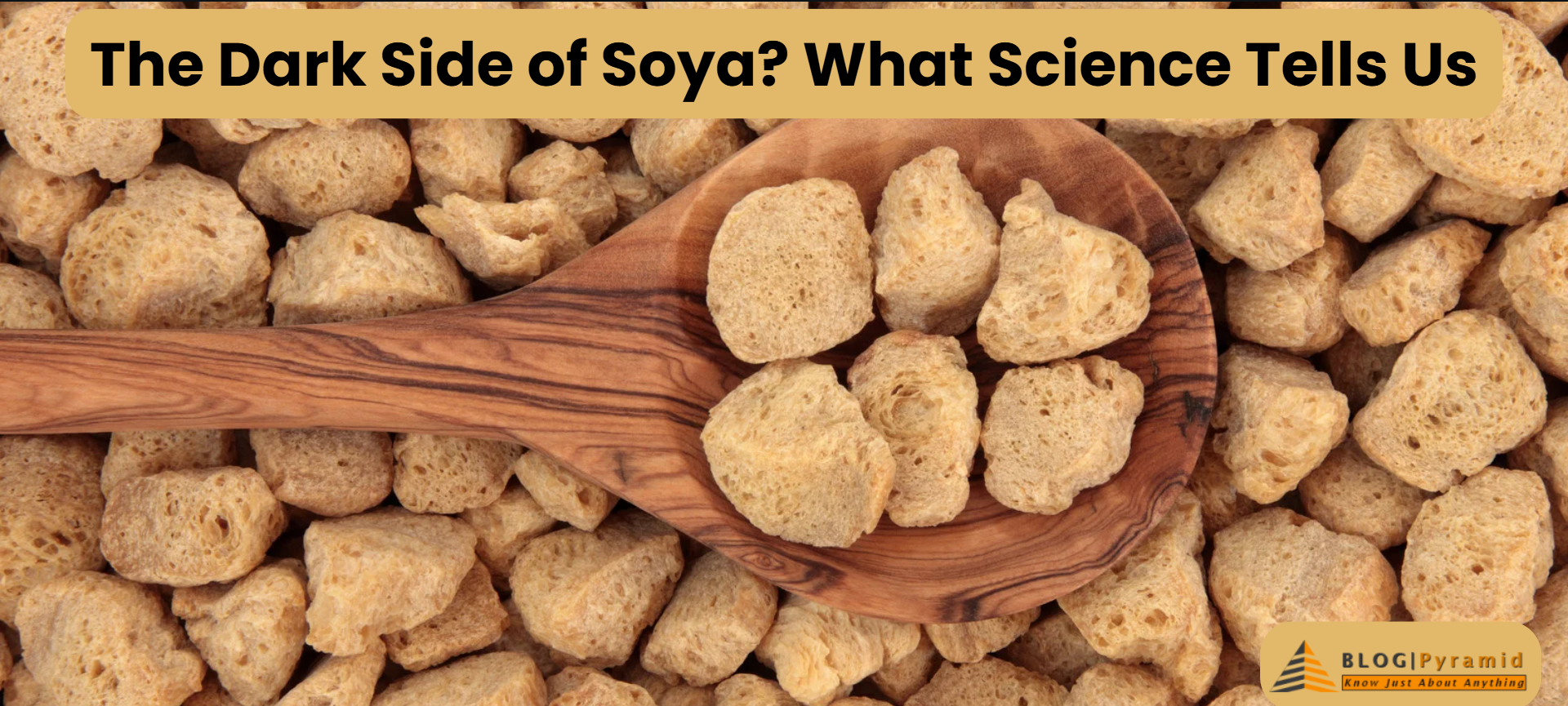
The Dark Side of Soya? What Science Tells Us
Soya (soybeans and products derived from them) is often praised for its high-quality plant protein, fiber, and various nutrients. But like many foods, it can have downsides—especially when consumed in excess, or in certain circumstances. Below I summarize what research has found regarding possible harmful effects, caveats, and what to watch out for.
What Are the Concerns?
Here are the main areas where soya has been associated with potential risks:
| Concern | What is the issue? |
|---|---|
| Hormonal effects / Phytoestrogens | Soya contains isoflavones, compounds that can mimic or interfere with estrogen. The fear is these might affect hormone balance, possibly influencing conditions sensitive to estrogen, such as breast cancer, prostate cancer, fertility, or menstrual cycles. Some animal and in vitro studies show effects; human data are less clear. The Times of India+3eufic.org+3Healthline+3 |
| Thyroid function | Isoflavones and other compounds in soya may interfere with the thyroid, especially in those who have pre-existing thyroid issues or low iodine intake. They may inhibit thyroid-peroxidase (an enzyme needed for thyroid hormone synthesis). Human studies find mild effects or none in those with healthy thyroid function. The Times of India+3eufic.org+3Healthline+3 |
| Digestive issues / Antinutrients | Soya contains antinutrients such as trypsin inhibitors, phytates, and lectins (e.g. soybean agglutinins), which can interfere with digestion, reduce the absorption of minerals (iron, zinc, calcium), or cause gut discomfort (bloating, gas, etc.). Proper preparation (soaking, cooking, fermenting) reduces many of these. The Times of India+3Healthline+3NCCIH+3 |
| Allergic reactions / Sensitivities | Soya is one of the common food allergens, especially in children. Reactions can range from mild to serious. NCCIH+1 |
| Effects on male reproductive hormones / “Feminizing effects” | There is a popular concern that soy’s phytoestrogens might lower testosterone or cause effects like gynecomastia (“man boobs”) or reduced fertility. However, many high-quality human studies and meta-analyses show no or negligible effect on testosterone or male fertility in typical dietary amounts. Healthline+1 |
| Potential interference with medications or nutrient uptake | Soya (especially high amounts) may affect absorption of certain medications (e.g. thyroid hormone replacements) or nutrients due to antinutrients. Also, low iodine diets in combination with soy intake could increase risk of thyroid issues. eufic.org+1 |
How Strong Is the Evidence?
-
Many of the risks come from animal or lab studies, where doses are often much higher (relative to body weight) than what humans consume. These are useful for hypotheses, but not always directly applicable. eufic.org+1
-
Human observational studies have mixed results. In many cases, soya seems neutral or even protective for things like heart disease, cancer risk, or diabetes when consumed as part of a balanced diet. NCCIH+3PubMed+3MDPI+3
-
Effects may depend heavily on quantity, type of soya product (whole, fermented vs highly processed), preparation method, individual susceptibility (thyroid health, iodine status, hormonal profile), and overall diet quality. eufic.org+2The Times of India+2
Who Should Be More Careful?
Certain people might want to moderate their soya intake or discuss with a healthcare provider:
-
Those with existing thyroid disorders, especially if iodine intake is low.
-
Those taking thyroid medication, to avoid interference with absorption.
-
People sensitive to hormonal effects (history of hormone-sensitive cancers) may want to monitor or choose types of soya with less phytoestrogen content.
-
Individuals with soya allergy or intolerance.
-
Very young infants, especially if using soya formula (there are debates, though most data suggest safety in typical amounts).
How Much Is Too Much?
There isn’t an agreed “upper limit” for soya that’s harmful. But based on current evidence:
-
Moderate consumption (e.g. a few servings per day of whole or fermented soya foods) is generally safe for most people.
-
Very high consumption (large daily amounts, heavy reliance on processed soy protein isolates or supplements) may increase the chance of side effects.
-
Preparation matters: fermenting, soaking, proper cooking reduce many undesirable compounds.
Practical Tips to Minimize Risk
-
Prefer whole or fermented soya products — tofu, tempeh, miso, edamame — over heavily processed isolates or bars with soy protein.
-
Don’t rely on soya as the only protein source — diversify with legumes, pulses, nuts, dairy or other vegetarian/animal proteins depending on diet.
-
Ensure adequate iodine intake, especially for those at risk of thyroid issues (iodised salt, sea vegetables etc.).
-
Spacing of medication and soya consumption, particularly thyroid medicines: take medications on an empty stomach, avoid large soya meals close to dosing.
-
Watch for symptoms — digestive discomfort, hormonal changes, skin/hair changes, menstrual irregularities — and consult healthcare provider if persistent.
Soya: key studies on possible harms (with effect sizes / findings)
1) Soya and male reproductive hormones — large meta-analysis
-
Study / source: “Neither soy nor isoflavone intake affects male reproductive hormones: An expanded and updated meta-analysis” — meta-analysis of clinical studies.
-
What they did / size: 41 studies; 1753 men for total testosterone (TT), 752 men for free testosterone (FT). PubMed
-
Main finding (effect size): No significant effect of soy protein or isoflavone exposure on TT, FT, estradiol, estrone or SHBG — across doses and durations. In short: no measurable “feminizing” effect on men in clinical trials. PubMed
2) Soya and thyroid function — systematic reviews/meta-analyses
-
Study / source: Reviews and meta-analyses summarized in major reviews (e.g., Health effects of soy: A reference guide for health professionals). PMC+1
-
Main findings / effect sizes: Clinical trials overall show no clinically meaningful change in free thyroid hormones in euthyroid (healthy thyroid) people. Some analyses report small or modest increases in TSH in a minority of trials (and primarily when iodine intake is low or in supplemented high-dose contexts), but no consistent reduction in free T4/free T3 for people with normal thyroids. Those with pre-existing hypothyroidism or low iodine status may be more vulnerable; soy may also interfere with levothyroxine absorption if consumed close to dosing. PMC+1
3) Antinutrients (phytates, trypsin inhibitors) — effects on mineral absorption and digestion
-
Phytates & mineral absorption: Phytic acid in soy can inhibit non-heme iron, zinc and (to a lesser extent) calcium absorption in acute studies. For example, an older controlled study showed fractional calcium absorption from high-phytate soybeans was ~0.310 vs ~0.377 for low-phytate soybeans (both less than cow’s milk absorption but still substantial). Chronic diets show adaptation that reduces the phytate effect over time. Default+1
-
Trypsin inhibitors: Raw/underprocessed soy contains trypsin inhibitors (Bowman–Birk and Kunitz types) that can reduce digestive protease activity in animals. Heat/cooking and typical food processing deactivate most of these; clinical/epidemiological evidence indicates properly prepared soyfoods pose little risk to humans, but raw/very undercooked soy can be problematic in experimental animal studies. PubMed+1
4) Soya and cardiometabolic markers — mixed results (some modest benefits)
-
Study / source: Systematic reviews / meta-analyses of randomized controlled trials in postmenopausal women and other groups. One Nutrients meta-analysis (2021) evaluated soy protein/isoflavone effects on lipid profile. MDPI
-
Main findings / effect sizes: Results vary by population and product; some trials show modest LDL-C reductions or improvements in lipid markers, while others are null. Net: no strong, consistent adverse cardiometabolic signal in RCTs — if anything, many trials show small benefits in certain subgroups. MDPI
5) Soya and inflammation / adipokines — umbrella/meta findings
-
Study / source: Recent umbrella/meta-analyses of clinical trials on adiponectin/leptin and other markers. Example: effect on adiponectin was ES = 0.10 (95% CI −0.22 to 0.41) — not significant. PubMed
-
Main takeaway: No consistent harmful effects on these systemic metabolic markers in RCTs; effects tend to be small or null. PubMed
Fermented vs Non-fermented soya — what studies show
Fermented soya (tempeh, miso, natto, douchi, doenjang, kinema, etc.)
-
Review evidence: A recent comprehensive review of fermented soyfoods summarizes multiple potential benefits: improved bioavailability of nutrients, increased levels of aglycone isoflavones (more bioavailable), presence of probiotic microorganisms, and reduced antinutrients (phytates and some protease inhibitors). Fermented soy has been linked in observational and some clinical studies with reduced risks of some chronic diseases (cardiovascular, metabolic), better gut health, and — for some specific products (natto) — bone health benefits (vitamin K2 / nattokinase). PMC+1
-
Mechanism: Fermentation enzymatically converts isoflavone glycosides to aglycones (genistein, daidzein) which are more readily absorbed, and degrades phytates / trypsin inhibitors, reducing antinutrient effects. PMC
Non-fermented soya (tofu, soymilk, soy flour, isolated soy protein)
-
Notes: Non-fermented whole soyfoods still provide good protein and micronutrients, but may contain more phytate and incompletely degraded protease inhibitors compared with fermented forms. Tofu and calcium-set soymilk often have acceptable calcium bioavailability (comparable to cow’s milk when fortified or calcium-set), though iron/zinc absorption can be lower acutely. Default+1
Net comparison (what the evidence supports)
-
Fermented soyfoods generally have a more favorable nutrient-bioavailability profile and offer probiotic benefits; they also tend to reduce antinutrients and may show stronger associations with some health benefits in population studies. Non-fermented soy is still nutritious and safe when cooked/processed appropriately, but may require complementary dietary practices (e.g., vitamin C to enhance iron absorption, iodized salt if thyroid risk). PMC+1
Practical, evidence-based takeaways (short)
-
Most strong claims of major harms (e.g., “soy makes men feminine” or “soy wrecks your thyroid”) are not supported by the best available human trials and meta-analyses. Large meta-analyses find no effect on male testosterone and no consistent deleterious effect on thyroid hormones in people with normal thyroid function. PubMed+1
-
At-risk groups: people with existing hypothyroidism (especially with low iodine), those on thyroid replacement, infants on soy formula, and people with soy allergy should consult clinicians. Soy can affect thyroid medication absorption and may modestly raise TSH in susceptible contexts. PMC+1
-
Antinutrients are real but manageable: phytates and trypsin inhibitors can reduce mineral absorption or protein digestibility in raw soy — but cooking, soaking, fermenting or consuming a mixed diet mitigate most risks. Chronic adaptation also lessens acute phytate effects. Default+1
-
Prefer whole and fermented soyfoods (tempeh, miso, natto, tofu, edamame) over ultraprocessed soy isolates and bars if you want to maximize benefits and minimize potential downsides. Fermented forms often have better bioavailability and probiotic benefits. PMC+1
Selected references (clickable sources used above)
-
Meta-analysis — Soy & male hormones: PubMed summary / meta-analysis (41 studies; 1,753 men). PubMed
-
Review — Health effects of soy: reference guide for health professionals (summary of thyroid evidence, isoflavone research). PMC+1
-
Review — Fermented soy products and their potential health benefits (comprehensive review of tempeh/miso/natto/others). PMC
-
Phytate / mineral absorption discussion (incl. calcium fractional absorption numbers). Default+1
-
Nutrients meta-analysis — Soy isoflavones and lipid profile (postmenopausal women). MDPI
-
Umbrella/meta — Adiponectin/leptin & soy (effect size example showing null effect). PubMed
Summary
Soya offers many nutritional benefits and, for most people, moderate consumption is safe and may even offer protective health effects. However, like many foods, it has potential risks, especially at high doses, in processed forms, or under special health conditions.
The takeaway? Soya doesn’t need to be feared, but it should be treated like any other potent food — used wisely, in good forms, and in balance.





